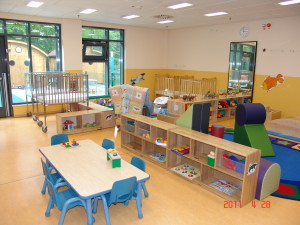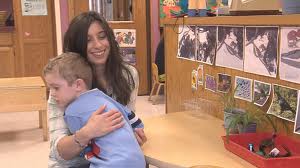The Importance of Early Education
Early education is a topic that covers a wide range of aspects. Everything a child is exposed to has the potential to teach them- whether it is social skills, motor skills or skills that are more cerebral. A child begins to learn more formally between the ages of 4-6, but this is usually done in a more flexible, motivating and fun environment such as Kindergarten. Kindergarten also helps children adjust to a more school-like structure, with school desks and chairs, scheduled playtime and more formal learning activities and classes.
Early educators have the privilege and responsibility to give children a positive introduction to learning, providing them with the confidence and the tools to succeed throughout their academic lives.
Let Children Play
Introducing Young Children to the Classroom
 Young children often see the first day of school as an adventure. They pick out their clothes the night before, pack their backpacks with new pencils and notebooks, and wake up at the crack of dawn filled with excitement and anticipation.
Young children often see the first day of school as an adventure. They pick out their clothes the night before, pack their backpacks with new pencils and notebooks, and wake up at the crack of dawn filled with excitement and anticipation.
At school, they are exposed to many new people, sights and experiences. It is easy for a small child to get overwhelmed and distracted. Experienced teachers know how important it is to ease students into a school routine without putting too much pressure on them in the beginning. It is understandable that a child may become restless while sitting at school furniture for the first time, so creating an active, dynamic classroom environment is essential. This helps new students feel more comfortable and confident, and sets them up for future success at school.
Playing with Your Child for Early Development
Interesting stuff about playing with your child, from the lovely @Lulubabycouk gang and @TheBabyExpert… http://t.co/xJanD84XoX
— Eleanor Tucker (@ElleTucker) November 25, 2013
Creating a Welcoming Environment for Children
 Young children may have a hard time adjusting to school schedules and structures. Experienced teachers know that first impressions and friendly, engaging environments can make all of the difference for a nervous of insecure child.
Young children may have a hard time adjusting to school schedules and structures. Experienced teachers know that first impressions and friendly, engaging environments can make all of the difference for a nervous of insecure child.
Classroom setups are very important in any grade, but kindergarten and first grade students are easily influenced, and it is important to introduce them to learning in a fun, relaxed way. Classroom furniture can create an interesting, dynamic environment depending on colors and design, as can colorful carpets, graphs and bulletin boards. Reading corners, arts and crafts and other activities will also help children develop confidence and social skills essential for later learning.
Don’t Limit Your Child’s Learning…
Child Education- When Should You Start?
 Many parents think education begins in school chairs, but they are most definitely mistaken. Children start to learn from the moment they are born; in fact, many studies explore the infant’s ability to absorb and process new information. Research has proven that certain colors and sounds have a significant impact on babies’ cerebral development, and that early learning and education have numerous benefits. Early childhood learning experiences can also leave children with a thirst for knowledge, encouraging them to pursue their own interests, seek out information and get creative.
Many parents think education begins in school chairs, but they are most definitely mistaken. Children start to learn from the moment they are born; in fact, many studies explore the infant’s ability to absorb and process new information. Research has proven that certain colors and sounds have a significant impact on babies’ cerebral development, and that early learning and education have numerous benefits. Early childhood learning experiences can also leave children with a thirst for knowledge, encouraging them to pursue their own interests, seek out information and get creative.
Some great ways to get started at home include teaching your child the alphabet, letting them play with puzzles, musical instruments and interactive games, taking them for nature walks and visits to the zoo, teaching them numbers and how to count, and so much more!
Early Child Education and Development
Child education does not begin with school desks. In fact, some women believe that they can begin to enhance their children’s brains in utero. Studies have shown that newborns benefit greatly from listening to classical music, and that their brains are stimulated greatly by soothing sounds such as waves, birds, leaves and other nature noises.
Baby Einstein, for example, is a company which aims to enhance infant development through discovery and entertainment. Their products “incorporate unique combinations of real world objects, languages, numbers, music, art, animals and nature.”
Here is Baby Einstein’s ‘World Animals’ video, which aims to help mental development in children under two years of age.
Early Childhood Education Gives Results
 There are many benefits to early childhood education for children from low-income families. In one famous study conducted in Ypsilanti, Michigan, 3-4 year olds were randomly assigned to a group that did not receive preschool education, and another group that did. Results of the study showed that there was a five times greater chance of those children that did not receive a pre-school education to become chronic lawbreakers by the time they reached 18 than those that did get early childhood education.
There are many benefits to early childhood education for children from low-income families. In one famous study conducted in Ypsilanti, Michigan, 3-4 year olds were randomly assigned to a group that did not receive preschool education, and another group that did. Results of the study showed that there was a five times greater chance of those children that did not receive a pre-school education to become chronic lawbreakers by the time they reached 18 than those that did get early childhood education.
The same Michigan study showed that low-income children who were enrolled in a good preschool program had higher salaries than those that did not, by age 40, of about $5500 per year. There was also a greater likelihood of people who went to preschool to graduate from high school, own a home, and keep their marriages together longer.
The reason such results are seen are pretty clear. From the moment a visitor steps up to the reception desk until they end their visit they will see an environment which is nurturing, stimulating, and secure. The children’s physical needs are met to a high standard, while their emotional needs are also supported. It is no wonder that children with such a strong, healthy foundation grow up to be successful members of their communities.
